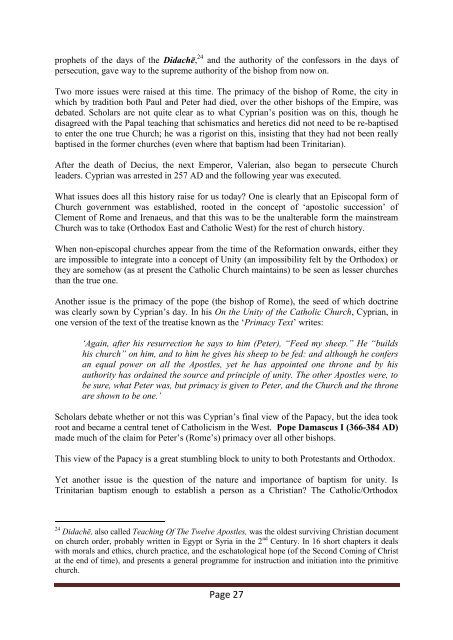Digging Out the Embedded Church - The Maranatha Community
Digging Out the Embedded Church - The Maranatha Community
Digging Out the Embedded Church - The Maranatha Community
You also want an ePaper? Increase the reach of your titles
YUMPU automatically turns print PDFs into web optimized ePapers that Google loves.
prophets of <strong>the</strong> days of <strong>the</strong> Didachē, 24 and <strong>the</strong> authority of <strong>the</strong> confessors in <strong>the</strong> days of<br />
persecution, gave way to <strong>the</strong> supreme authority of <strong>the</strong> bishop from now on.<br />
Two more issues were raised at this time. <strong>The</strong> primacy of <strong>the</strong> bishop of Rome, <strong>the</strong> city in<br />
which by tradition both Paul and Peter had died, over <strong>the</strong> o<strong>the</strong>r bishops of <strong>the</strong> Empire, was<br />
debated. Scholars are not quite clear as to what Cyprian‟s position was on this, though he<br />
disagreed with <strong>the</strong> Papal teaching that schismatics and heretics did not need to be re-baptised<br />
to enter <strong>the</strong> one true <strong>Church</strong>; he was a rigorist on this, insisting that <strong>the</strong>y had not been really<br />
baptised in <strong>the</strong> former churches (even where that baptism had been Trinitarian).<br />
After <strong>the</strong> death of Decius, <strong>the</strong> next Emperor, Valerian, also began to persecute <strong>Church</strong><br />
leaders. Cyprian was arrested in 257 AD and <strong>the</strong> following year was executed.<br />
What issues does all this history raise for us today? One is clearly that an Episcopal form of<br />
<strong>Church</strong> government was established, rooted in <strong>the</strong> concept of „apostolic succession‟ of<br />
Clement of Rome and Irenaeus, and that this was to be <strong>the</strong> unalterable form <strong>the</strong> mainstream<br />
<strong>Church</strong> was to take (Orthodox East and Catholic West) for <strong>the</strong> rest of church history.<br />
When non-episcopal churches appear from <strong>the</strong> time of <strong>the</strong> Reformation onwards, ei<strong>the</strong>r <strong>the</strong>y<br />
are impossible to integrate into a concept of Unity (an impossibility felt by <strong>the</strong> Orthodox) or<br />
<strong>the</strong>y are somehow (as at present <strong>the</strong> Catholic <strong>Church</strong> maintains) to be seen as lesser churches<br />
than <strong>the</strong> true one.<br />
Ano<strong>the</strong>r issue is <strong>the</strong> primacy of <strong>the</strong> pope (<strong>the</strong> bishop of Rome), <strong>the</strong> seed of which doctrine<br />
was clearly sown by Cyprian‟s day. In his On <strong>the</strong> Unity of <strong>the</strong> Catholic <strong>Church</strong>, Cyprian, in<br />
one version of <strong>the</strong> text of <strong>the</strong> treatise known as <strong>the</strong> „Primacy Text‟ writes:<br />
„Again, after his resurrection he says to him (Peter), “Feed my sheep.” He “builds<br />
his church” on him, and to him he gives his sheep to be fed: and although he confers<br />
an equal power on all <strong>the</strong> Apostles, yet he has appointed one throne and by his<br />
authority has ordained <strong>the</strong> source and principle of unity. <strong>The</strong> o<strong>the</strong>r Apostles were, to<br />
be sure, what Peter was, but primacy is given to Peter, and <strong>the</strong> <strong>Church</strong> and <strong>the</strong> throne<br />
are shown to be one.‟<br />
Scholars debate whe<strong>the</strong>r or not this was Cyprian‟s final view of <strong>the</strong> Papacy, but <strong>the</strong> idea took<br />
root and became a central tenet of Catholicism in <strong>the</strong> West. Pope Damascus I (366-384 AD)<br />
made much of <strong>the</strong> claim for Peter‟s (Rome‟s) primacy over all o<strong>the</strong>r bishops.<br />
This view of <strong>the</strong> Papacy is a great stumbling block to unity to both Protestants and Orthodox.<br />
Yet ano<strong>the</strong>r issue is <strong>the</strong> question of <strong>the</strong> nature and importance of baptism for unity. Is<br />
Trinitarian baptism enough to establish a person as a Christian? <strong>The</strong> Catholic/Orthodox<br />
24 Didachē, also called Teaching Of <strong>The</strong> Twelve Apostles, was <strong>the</strong> oldest surviving Christian document<br />
on church order, probably written in Egypt or Syria in <strong>the</strong> 2 nd Century. In 16 short chapters it deals<br />
with morals and ethics, church practice, and <strong>the</strong> eschatological hope (of <strong>the</strong> Second Coming of Christ<br />
at <strong>the</strong> end of time), and presents a general programme for instruction and initiation into <strong>the</strong> primitive<br />
church.<br />
Page 27








